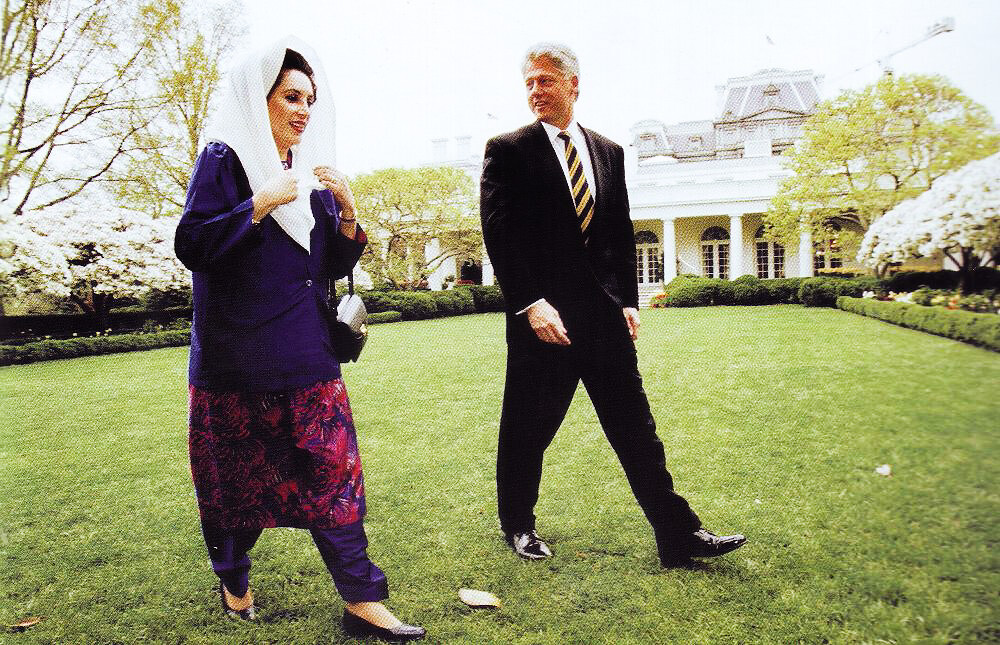It is worth recalling that in 1994 in an intervention in the House of Representatives on June 22nd, Bill McCollum, lawyer and Republican Party politician, drew attention to the Benazir Govt going back on words vis-a-vis terror support in Kashmir.
He said: "I rise today to bring to the attention of the House a very important matter. The role of Pakistan in aiding and abetting terrorism in Kashmir is well documented, so much so that the administration almost placed the Pakistani regime on the 1993 list of State-sponsors of terrorism.
However, he hastened to add : "... the administration did not take such action because it was assured by Pakistan that Islamabad was taking credible steps to dissociate itself from the militants in Kashmir".
Referring all these have become relevant in December 2024 as Pakistan is now at the receiving end of militancy from Afghanistan.
We may blame Pakistan - that's quite easy. What about the role of the US administration under Bill Clinton ?
The fact of the matter is Benazir, who returned to power end-1993, did co-operate with Washington in acting against narcotics barons and terrorists in whom the US was interested.
But in 1994 it was reported that her Govt "went back on her assurance" to the White House to stop the ISI's support to terrorism in India and other countries
All that she did was:
***First, asked the ISI to interact with the terrorist groups indirectly through cut- outs such as the JEI, the HUM, the Markaz, the Lashkar etc, instead of directly as in the past
*** Second, the Benazir Govt claimed to have "persuaded" the HUM, the Markaz, the Lashkar and the Hizbul Mujahideen to shift their training camps to Afghan territory under the ISI's control
Another point that was vital was -- the then Pak PM Benzair (claimed to have) "entrusted Maj-Gen. (retd) Nasirullah Babar, her Interior Minister" with the responsibility for overseeing the ISI activities so that unauthorised rogue actions like the ISI helping the LTTE did not occur again.
Interestingly, Babar had headed the Afghan Division of the ISI when her father Zulfikar Ali Bhutto was the Prime Minister.
It may be also stated here around that time the Narasimha Rao government was briefed by intelligence agencies and other sources -- that ..
-- "The Extremist elements from Kashmir and other parts of India continued going to the training camps in Afghan territory and the infiltration of Pakistani and other mercenaries into Kashmir was intensified".
An Aljajeera article (Dec 30, 20240 sums up the paradox well.
"As Pakistan, Afghanistan attack each other, what’s next for neighbours?
Experts say both sides need to reset their approach towards the other — even as mounting tensions have eroded trust between old allies Pakistan and the Afghan Taliban."
The story also claims - the latest round of cross-border fighting stems from what Pakistan insisted was its response to regular attacks by the armed group Tehreek-e-Taliban Pakistan (TTP), which Islamabad said has found sanctuary across the border in Afghanistan.
The most recent TTP attack, on December 21, led to the deaths of at least 16 Pakistani soldiers.
Back to 1990s and it is significant to note that a "detailed Press briefing on this subject was held by Mike McCurry, the then spokesman of the State Department, on July 15,1993".
The text of the briefing was carried by the "Dawn" of Karachi on July 16,1993 The "Dawn's" report quoted McCurry as saying
-- "In the last six months we have seen a willingness on their (Pakistan's) part to work with us on this issue, that they have addressed some of the concerns that we have raised with them in the past and they are co-operating with us in getting additional information to us about issues that we have raised as recently as in the annual terrorism report that we released in April.
So, I would describe as being much more co-operative on the specific issue of acts of international terrorism, which is what the statute requires."
One of the American correspondents asked McCurry whether the decision to let Pakistan off the hook was because Washington did not want to alienate an important Muslim country of the region.
McCurry responded : "The Secretary (of State) followed the letter of the law in this case and that's the most important criteria. But, obviously, any decision like this that's very important, the full range of criteria that might be considered are under review"
McCurry evaded questions to spell out the US concerns, which Pakistan had addressed satisfactorily, as claimed by the State Department.
However, a joint analysis by R.Jeffrey Smith and Thomas W Lippman carried by the "Washington Post" of July 15,1993, stated as follows
"Pakistan's alleged links to terrorism had initially aroused US concerns last year (1992). The Clinton Administration began a special intelligence community study of the matter this spring after receiving what officials said were credible reports of Islamabad's involvement in terrorism.
" In particular, officials said, Pakistani intelligence and army operatives had funneled money and arms and provided training to Muslim and Sikh militants who opposed India's rule of Kashmir and Punjab in 1991 and 1992.
US officials also accused the (Pakistan) Government of permitting Islamic fundamentalists, who had been involved in the Afghanistan conflict, to engage in terrorist activities in other nations from sanctuary in Pakistan.
"He (McCurry) declined to state exactly what steps Pakistan had taken, but other US officials said the Pakistani Government appears to have ended some of its ties to suspected terrorists and had fired a senior Pakistani intelligence official linked to terrorists in Kashmir."











No comments:
Post a Comment